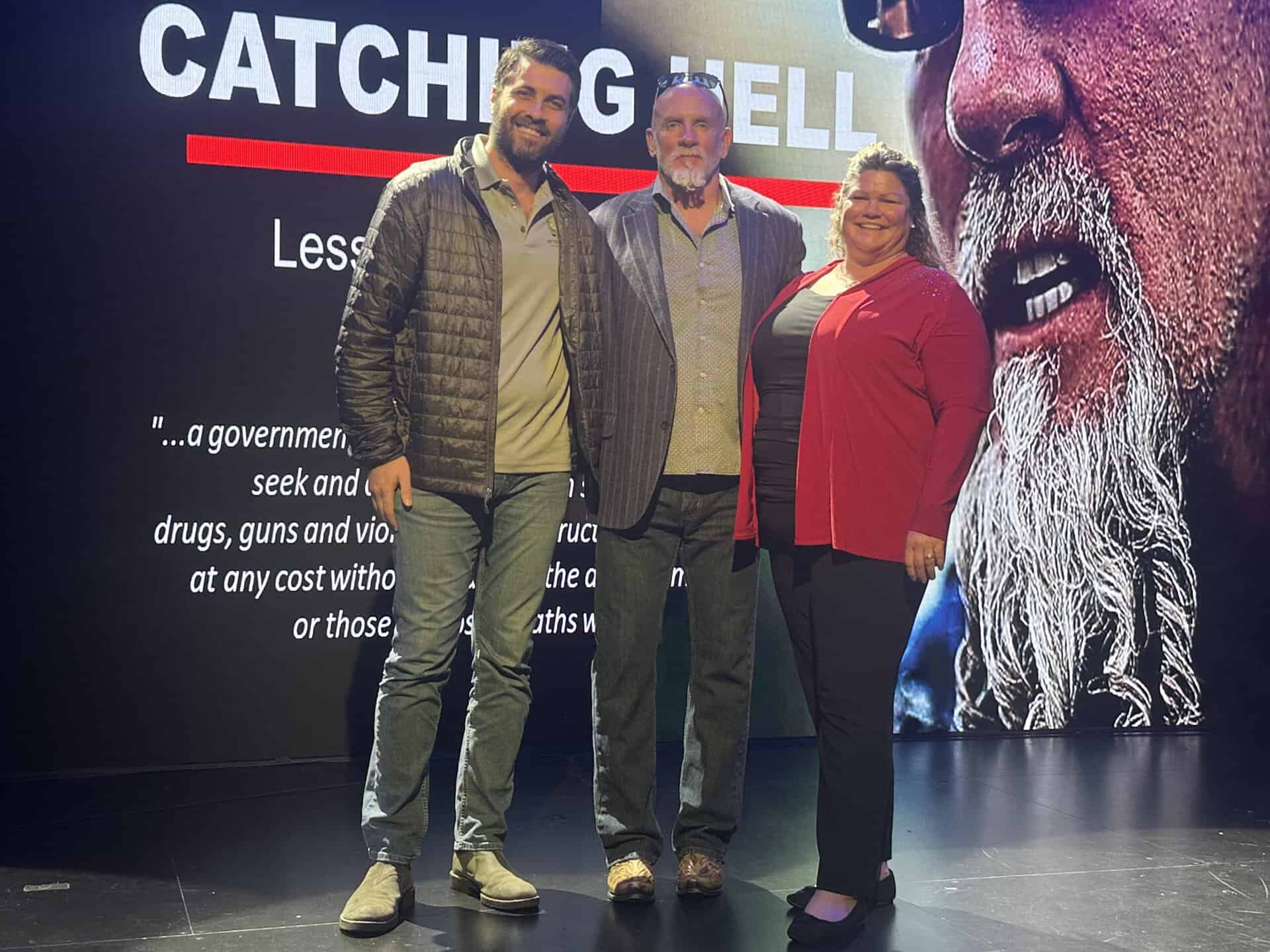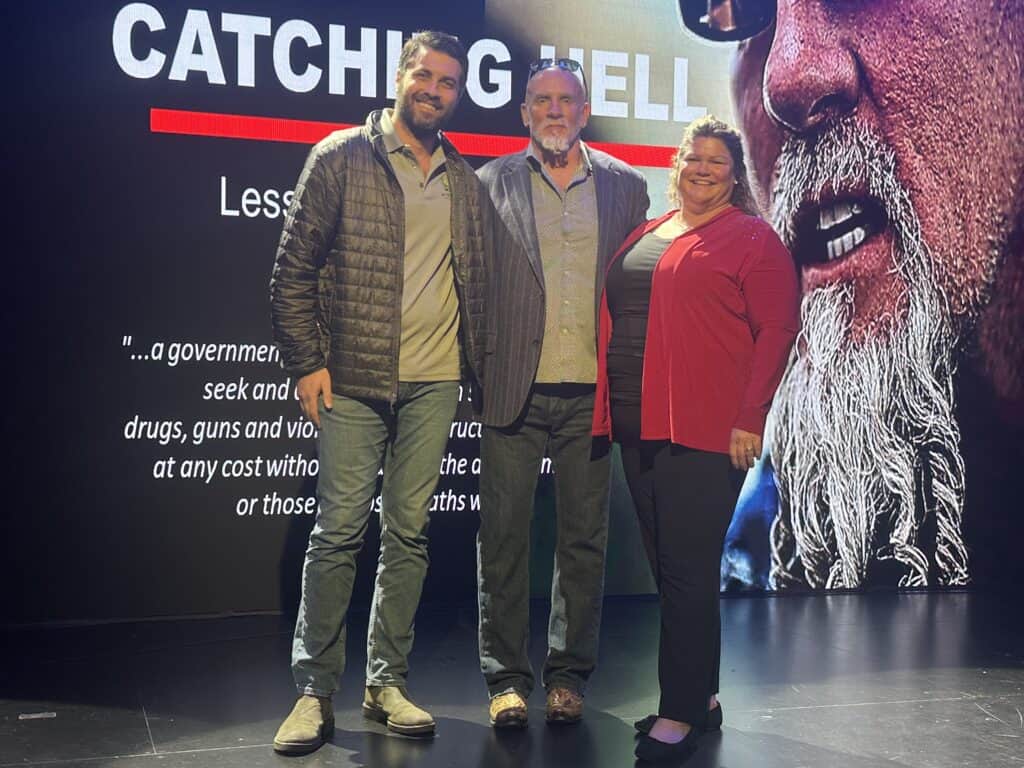Courage Undercover: How Jay Dobyns Inspires Wellness in Law Enforcement
3/6/2025 by Markie Bryant

Table of Contents
When law enforcement officers gather to share stories and insights, it’s more than just an event—it’s a lifeline. The Bakersfield Police Department Wellness Center recently hosted an inspiring speaking engagement featuring Jay Dobyns, a former undercover ATF agent whose life story is nothing short of extraordinary. Dobyns, best known for infiltrating the Hells Angels motorcycle gang, shared his harrowing experiences and the deep personal toll that his undercover work took on his mental health and family life.
His story is not just about bravery under fire; it’s about the unseen emotional and psychological battles faced by law enforcement professionals every day. Dobyns’ journey serves as a powerful reminder of why programs like the Bakersfield Police Department Wellness Center and After Action are vital for supporting the well-being of officers and first responders.
Jay Dobyns: The Undercover Mission That Nearly Cost Him Everything
Jay Dobyns is one of the most well-known undercover ATF agents in history. Over the course of his career, he worked on hundreds of operations, but his most dangerous and high-profile assignment came in the early 2000s: infiltrating the notorious Hells Angels Motorcycle Club.
For two years, Dobyns lived undercover, assuming the role of a hardened criminal who could gain the trust of one of the most dangerous gangs in the world. His mission? To gather intelligence on the gang's criminal activities, including drug trafficking, weapons dealing, and violent crimes.
To gain the Hells Angels’ trust, Dobyns had to fully immerse himself in their world, staging fake crimes and even participating in acts of simulated violence. He described these years as living in a constant state of paranoia, knowing that any misstep could blow his cover and cost him his life. The physical danger was relentless—Dobyns received numerous death threats from gang members and rival criminals.
But the most significant toll was emotional and psychological. He was away from his family for extended periods, unable to be a father to his children or a husband to his wife. The lines between his real identity and his undercover persona blurred, leaving him feeling isolated and disconnected from the world he had once known.
The Mental Health Fallout
Dobyns’ undercover work came with a price far greater than the immediate physical dangers. Long after the operation ended, he struggled with severe PTSD (post-traumatic stress disorder) and the lingering psychological scars of the job.
- PTSD Symptoms:
- Nightmares and flashbacks of violent scenarios.
- Paranoia and hypervigilance, even in safe environments.
- Difficulty trusting others, even family and friends.
- Struggles with Family:
- Dobyns has been candid about how his work strained his marriage and family relationships. The emotional distance caused by his undercover role created barriers that took years to overcome.
- Lack of Institutional Support:
- After his operation concluded, Dobyns found himself feeling abandoned by the very institution he had served. He became the target of threats, including an incident where his home was burned down in an arson attack. Dobyns alleges that the ATF failed to adequately protect him or his family during these threats, further intensifying his struggles with anxiety and trust.
- Facing Stigma:
- Like many in law enforcement, Dobyns faced the stigma surrounding mental health issues. Initially reluctant to seek help, he believed that asking for assistance might be viewed as a sign of weakness—a common barrier for many first responders.
Breaking the Stigma: The Role of Wellness Programs
Events like the Bakersfield Police Department Wellness Center’s engagement with Jay Dobyns are helping to change the narrative around mental health in law enforcement. By openly discussing his struggles and path to recovery, Dobyns reminded officers that it’s okay to admit when they’re struggling—and that there’s no shame in asking for help.
The Bakersfield Police Department Wellness Center is a shining example of how wellness programs can make a difference. The center offers resources, support, and events like this one to help officers build resilience and address mental health challenges head-on.
These programs are more than just a resource—they’re a lifeline. They break the stigma around mental health, provide confidential support, and remind first responders that they don’t have to navigate their struggles alone.
After Action: A Specialized Resource for First Responders
For law enforcement officers and first responders looking for more in-depth support, After Action is an invaluable resource.
Designed exclusively for first responders, After Action offers:
- Confidential mental health and addiction treatment.
- A tailored approach that recognizes the unique pressures of law enforcement careers.
- The 2-Week Tune-Up Program, an intensive option that helps officers process trauma, rebuild resilience, and return to work quickly.
Like Dobyns, many officers carry the weight of their work long after their shifts end. After Action provides a safe space for them to unpack those burdens, heal, and emerge stronger.
Lessons from Jay Dobyns’ Story
Jay Dobyns didn’t just infiltrate the Hells Angels; he survived the aftermath of his undercover work and emerged as a powerful advocate for wellness. Here are some key takeaways from his story:
- Courage Isn’t Just Physical: True bravery lies in admitting when you need help and taking steps to heal.
- The Cost of Silence: Ignoring mental health struggles doesn’t make them go away—it amplifies them. Seeking support early can prevent long-term consequences.
- Support Systems Matter: Whether it’s a wellness center, peers, or programs like After Action, having a network of support is crucial for long-term resilience.
A Call to Action: Prioritizing Mental Health in Law Enforcement
The event at the Bakersfield Police Department Wellness Center wasn’t just about sharing Jay Dobyns’ story—it was a reminder of the importance of prioritizing wellness in law enforcement.
If you or someone you know is struggling with the pressures of a career in law enforcement, take the first step toward healing:
- Reach out to After Action. Their confidential programs are designed to meet the unique needs of first responders.
- Explore the resources offered by wellness centers like Bakersfield PD’s.
As Jay Dobyns said, “The greatest act of courage isn’t running into danger—it’s taking care of yourself so you can keep showing up for others.”
Resilience Starts Here
Jay Dobyns’ journey reminds us that resilience isn’t about being invincible—it’s about rising stronger after experiencing life’s hardest moments. His story is a testament to the incredible challenges law enforcement officers face, not just on the streets but within their own minds and hearts. By sharing his struggles with PTSD, isolation, and institutional betrayal, Dobyns opens the door for others in law enforcement to recognize that they are not alone. His message is clear: seeking help isn’t a sign of weakness—it’s an act of courage.
Events like the one hosted by the Bakersfield Police Department Wellness Center are essential for breaking down the barriers of stigma and building a culture of support within law enforcement. Programs like After Action further extend this support by offering specialized, confidential resources that help first responders heal from trauma and build resilience for the future. Whether it’s through individual therapy, peer groups, or innovative options like the 2-Week Tune-Up, these tools provide a lifeline for those struggling to manage the weight of their responsibilities.
The holiday season is an opportunity to reflect on the sacrifices made by law enforcement officers and the importance of providing them with the support they deserve. If you or someone you know is navigating the challenges of mental health or addiction, don’t wait to take action. Whether it’s reaching out to After Action, exploring local wellness centers, or simply starting a conversation, every step forward matters.
Resilience starts with acknowledging the need for change, and programs like After Action are here to help. Let Jay Dobyns’ story inspire you to take that first step toward healing—for yourself, for your loved ones, and for the future.
Frequently Asked Questions (FAQs)
1. Who is Jay Dobyns, and why is his story significant?
Jay Dobyns is a former undercover ATF agent best known for infiltrating the Hells Angels Motorcycle Club. His story highlights the immense dangers and psychological toll of undercover work, including the personal sacrifices he made to carry out his mission. Today, he advocates for mental health awareness and resilience, inspiring law enforcement professionals to prioritize their well-being.
2. What challenges did Jay Dobyns face after his undercover work?
Dobyns struggled with PTSD, paranoia, and the strain on his personal relationships after his undercover operation. He also faced threats to his safety, including the arson of his home, and felt abandoned by the institution he served. These experiences drove him to become a mental health advocate for law enforcement officers.
3. What is the Bakersfield Police Department Wellness Center?
The Bakersfield Police Department Wellness Center is a dedicated resource for law enforcement officers, offering support for mental health, resilience, and overall wellness. Through events like Jay Dobyns’ speaking engagement, the center provides opportunities for officers to address their challenges, connect with resources, and foster a culture of wellness.
4. How does After Action help law enforcement and first responders?
After Action offers confidential mental health and addiction treatment tailored to the unique challenges faced by law enforcement and first responders. Their programs, including the 2-Week Tune-Up, provide specialized care to help individuals process trauma, build resilience, and return to work stronger.
5. What is the 2-Week Tune-Up program?
The 2-Week Tune-Up is an intensive, short-term program offered by After Action that helps law enforcement officers and first responders address mental health and addiction challenges. Designed to fit the demanding schedules of first responders, it provides focused care to support recovery and resilience.
6. Why is it important to address mental health in law enforcement?
Law enforcement officers face high-stress situations, frequent trauma exposure, and long hours, which can lead to burnout, PTSD, addiction, and other mental health challenges. Addressing mental health ensures officers can perform their duties effectively while maintaining personal well-being.
7. How can family members support law enforcement officers struggling with mental health?
Family members can:
- Encourage open communication and listen without judgment.
- Suggest professional resources like After Action or local wellness programs.
- Create a supportive home environment that prioritizes mental health.
- Recognize the signs of stress, burnout, or PTSD and offer help.
8. How can someone get involved with After Action or the Bakersfield Police Department Wellness Center?
To connect with After Action, visit their website or contact their team directly to learn more about their programs. For the Bakersfield Police Department Wellness Center, reach out to their community relations team to inquire about upcoming events, resources, and how you can support their mission.